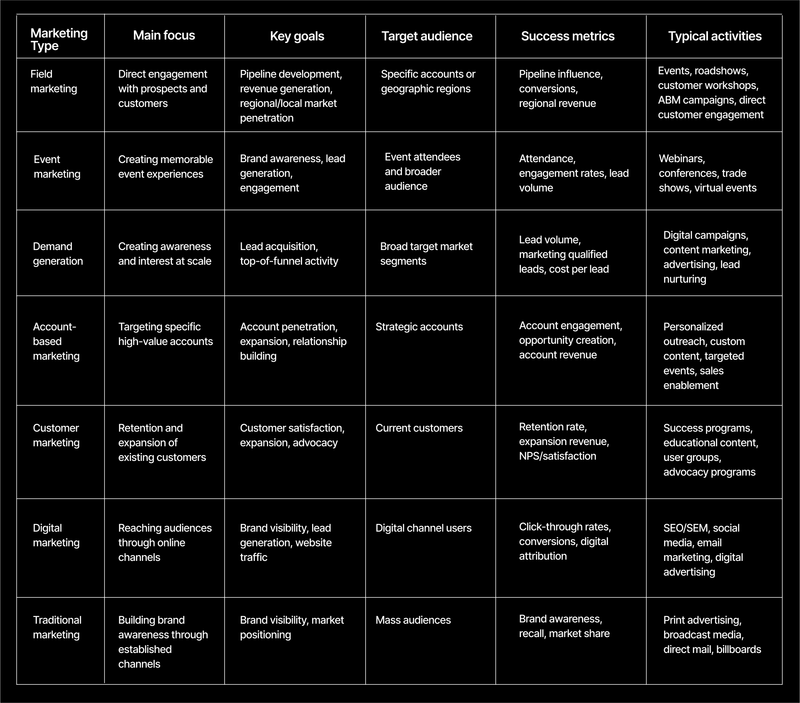What is Field Marketing? A Strategic Guide for B2B Marketers

Table of Contents
- What does a field marketer do?
- How field marketing compares to other marketing disciplines
- 10 field marketing strategies for increased engagement
- How AI and video are transforming field marketing
- Building your field marketing strategy
- Maximize your field marketing’s impact with Goldcast’s event-to-content engine
Maximize Your Marketing ROI
Join 10,000 other marketers already getting the best tips on running engaging events that boost pipeline and create raving fans.
Field marketing is a customer engagement strategy that connects brands with buyers through in-person, virtual, and hybrid events. It includes event marketing, account-based marketing (ABM) activities, and personalized outreach to drive brand awareness, lead generation, and revenue growth.
Today, field marketing has evolved beyond traditional face-to-face interactions to include digital experiences. Modern field marketers specialize in creating memorable brand experiences across multiple channels to drive pipeline and revenue.
What exactly does a field marketer do? And how can you use field marketing strategies effectively in your organization? Let's explore.
What does a field marketer do?
Field marketers work at the intersection of marketing and sales to create memorable brand experiences with target audiences and earn mindshare.
A field marketing manager's responsibilities typically include:
- Working closely with demand generation marketers to develop and execute strategies that create demand
- Managing campaigns throughout the lead lifecycle, from awareness and lead generation to nurturing and sales acceleration
- Telling the brand story through various types of event content, including emails, landing pages, webinars, video, case studies, and blog posts
- Measuring and reporting on results to demonstrate ROI
Field marketers are the boots on the (often digital) ground, creating experiences that turn prospects into customers into advocates.
How field marketing compares to other marketing disciplines
Field marketing complements many other marketing functions, but serves its own purpose in B2B marketing. Here’s a high-level overview of how field marketing compares to other areas of marketing:

Field marketing vs. event marketing
While field marketing often includes events as a key tactic, its scope extends beyond event execution. Field marketing aligns events with broader sales goals, while event marketing focuses on delivering exceptional event experiences.
Field marketing vs. demand generation
Demand generation casts a wide net to generate interest and leads at scale, while field marketing takes a more targeted, high-touch approach. Where demand gen focuses on creating initial awareness and interest, field marketing helps convert that interest into tangible opportunities and revenue.
Field marketing vs. account-based marketing
Field marketing and account-based marketing share a targeted approach, but field marketing typically operates with a segmented or event-based focus rather than at an account-specific level. While ABM zeroes in on individual accounts with highly personalized tactics, field marketing creates opportunities for engagement with multiple accounts in a specific segment.
Field marketing vs. customer marketing
Customer marketing focuses on existing customers to drive retention, expansion, and advocacy, while field marketing primarily targets prospects and opportunities. Field marketing emphasizes pipeline and new business development, while customer marketing concentrates on strengthening relationships with current customers and turning them into advocates.
Field marketing vs. digital marketing
Digital marketing uses online channels to reach audiences at scale, while field marketing creates direct, personal connections. Digital marketing excels at broad reach and data-driven optimization, whereas field marketing shines in creating memorable experiences and building face-to-face relationships.
Field marketing vs. traditional marketing
Traditional marketing uses established, one-way channels like print, broadcast, and outdoor to build broad brand awareness. Field marketing takes a more targeted, interactive approach focused on direct engagement with specific audiences.
➡️ The most effective B2B marketing strategies integrate all these disciplines, with field marketing serving as a bridge between broad marketing initiatives and specific sales opportunities.
10 field marketing strategies for increased engagement
Ready to strengthen your field marketing game? Here are ten proven strategies to boost engagement and drive results:
1. Host virtual and hybrid events
Virtual and hybrid events have become essential components of modern field marketing strategies. They help you reach wider audiences while still delivering personalized experiences. With the right hybrid event platform, you can create immersive virtual experiences that rival in-person events, complete with networking opportunities, interactive sessions, and real-time engagement.
2. Create multimodal content experiences
Today's B2B buyers consume content across multiple formats and channels. Successful field marketers create multimodal content experiences that combine video, text, and interactive elements.
Start with a cornerstone piece of content, like a webinar or virtual summit, then repurpose the content into blog posts, social snippets, and email campaigns. This approach maximizes your investment while catering to different consumption preferences.
3. Implement account-based marketing
ABM focuses resources on targeting and engaging specific high-value accounts. Field marketers can apply ABM principles by:
- Creating personalized event invitations for target accounts
- Developing custom follow-up content based on event participation
- Organizing exclusive roundtables for strategic accounts
- Collaborating with sales on account-specific engagement plans
ABM is about identifying accounts that are both winnable and retainable. “It’s plotting where the next wave of growth is going to come from,” explains 6Sense Chief Revenue Officer Latané Conant, “and ensuring it’s going to come from people that we can sell but also service. That’s the foundation of great ABM.”
4. Build influencer partnerships
Partnering with industry influencers can boost your field marketing efforts. Look for opportunities to co-host events, collaborate on content, or feature thought leaders in your event panels. These partnerships lend credibility to your brand and help you tap into existing communities.
5. Build community beyond events
Community building is a great way to turn one-time event interactions into ongoing relationships. Create spaces—online forums, social media groups, messenger apps—where your audience can connect, share insights, and continue conversations started at your events.
The goal is to become a meaningful part of your audience's professional lives by providing continuous value with a community.
6. Implement guerrilla marketing tactics
Guerrilla marketing uses unconventional, creative, and often low-cost strategies to create memorable brand experiences. In B2B contexts, this might include:
- Ambient marketing: Integrating brand messaging into everyday environments where your target audience spends time
- Experience-based marketing: Creating interactive installations or experiences at industry events
- Surprise and delight campaigns: Sending unexpected, creative gifts to prospects or clients
For example, way back in 2000, Salesforce staged a mock protest at a competitor's conference—a classic example of attention-grabbing guerrilla marketing.
7. Use video to extend your reach
Video content has become essential for field marketers looking to extend their reach and create more engaging experiences. Consider these video formats for your field marketing strategy:
- Event highlights and recap videos
- Speaker interviews and thought leadership content
- Product demonstrations and tutorials
- Customer testimonials and success stories
- Short-form social videos that repurpose event content
And you don’t need a polished, 5-minute explainer video. In B2B, micro-videos can make a big impact—marketers report that TikTok provides the second-highest ROI across social platforms (after Facebook).
8. Implement AI-powered personalization
AI tools help field marketers to deliver personalized experiences at scale. You can use AI to:
- Analyze event attendee data and recommend relevant content
- Create personalized follow-up sequences based on engagement
- Generate tailored video content for different audience segments
- Automate post-event content creation and distribution
AI can help you isolate and integrate a prospect’s interests and create experiences accordingly. “We always had personalization,” muses Chandar Pattabhiram, Chief GTM Officer at Workato, “but can you get to hyper-personalization?”
9. Focus on post-event follow-up
The success of your field marketing efforts often depends on what happens after an event. Develop a systematic approach to post-event follow-up that includes:
- Personalized outreach based on individual engagement
- Sharing relevant content resources
- Scheduling one-on-one meetings for qualified prospects
- Collecting feedback to improve future events
Remember to provide your sales team with account-level engagement insights so they can personalize their outreach and move conversations forward.
How AI and video are transforming field marketing
Field marketing is evolving with the integration of AI and video tech.
AI-powered event experiences
AI is enhancing event experiences in many ways:
- Personalizing content based on attendee interests
- Automating post-event follow-up and nurture sequences
- Identifying high-potential prospects with engagement data
- Creating better future events with detailed event analytics
Our Attendee Sentiment Report revealed that 66% of event attendees prefer to choose only the sessions they’re interested in—indicating that a highly-personalized experience is a better experience.
Video content repurposing
Video content is the foundation of a modern multimodal content strategy. Field marketers are increasingly creating video-first content that can be repurposed across multiple channels:
- Webinar recordings transformed into short social clips
- Event keynotes repurposed as blog content or podcasts
- Panel discussions edited into thought leadership series
- Product demos adapted for different audience segments
Justin Beredith, Digital Marketing Manager at Birdeye, explains the value of this approach: "If you create, produce, and promote a webinar for just one hour of content and then you leave it there, it's kind of a waste." Repurposing gets more mileage out of the content you’ve already invested in.
AI-assisted content creation
AI tools are making video content creation more accessible and efficient for field marketers:
- Automated video editing and clip generation
- AI-powered transcription and subtitle creation
- Content recommendation engines that identify key moments
- Personalized video creation at scale
- Video analytics to measure engagement and impact
Creating more content with less effort—plus ensuring consistent messaging—isn’t a dream. It’s a reality.
➡️ Try it for yourself: Upload a video and repurpose it in minutes for free with Goldcast Content Lab.
Building your field marketing strategy
Ready to try some of these field marketing tactics? Here's a framework to help you build a practical strategy.
1. Define your goals and objectives
Start by clearly defining what you want to achieve with your field marketing initiatives. Some common goals:
- Brand awareness and positioning
- Lead generation and pipeline creation
- Customer retention and expansion
- Thought leadership and market influence
- Revenue growth and market share expansion
Specific, measurable goals will guide your strategy and help you track progress.
2. Identify your target audience
You probably already have personas or ICPs, but which of them are you targeting with your field marketing strategy? Is it all of them, or just specific segments?
For your target segments, outline:
- Company size, industry, and geo
- Key decision-makers
- Pain points and challenges
- Buying processes and evaluation criteria
- Preferred content formats and channels
This understanding will help you create relevant, resonant experiences.
3. Develop your content strategy
Create a content plan that supports your field marketing objectives:
- Define key themes and messages aligned with audience needs
- Identify cornerstone content pieces like webinars or virtual events
- Plan repurposing across multiple formats
- Establish a content calendar with milestones
- Allocate resources for content creation and distribution
Remember that quality trumps quantity. Focus on creating valuable, insightful content that addresses your audience's needs.
4. Choose your channels and tactics
Select the channels and tactics that will best reach your target audience:
- Virtual and hybrid events
- In-person experiences and roadshows
- Video content and webinars
- Social media campaigns and community building
- Email marketing and direct outreach
A multichannel approach helps make sure you meet your audience where they are.
5. Measure and optimize
Of course, no marketing strategy is complete without the final step of performance tracking and optimization. Effective field marketing requires consistent measurement across key dimensions:
- Engagement metrics: Attendance rates, session participation, content downloads, interaction scores
- Pipeline metrics: MQLs/SQLs generated, opportunity creation, pipeline influence
- Revenue impact: Influenced revenue, deal size, overall ROI
- Content performance: Content consumption, sharing, conversion influence
Identify clear KPIs aligned with bottom-line objectives, establish tracking systems, and schedule regular reviews for continuous improvement.
Maximize your field marketing’s impact with Goldcast’s event-to-content engine
Field marketing has evolved from traditional face-to-face interactions to a sophisticated, multichannel discipline that blends in-person and digital experiences. With the strategies outlined in this guide, you can create engaging, impactful field marketing campaigns that drive meaningful business results.
Goldcast is purpose-built to support modern field marketers with tools to create immersive branded experiences, capture detailed engagement data, and seamlessly integrate with your tech stack.
Post-event, take your video content further, faster with Content Lab—an AI-powered tool that lets you generate video snippets, blog posts, and social media content in minutes rather than hours.
Ready to transform your field marketing strategy? Request a demo of Goldcast today and discover how our platform can help you create engaging experiences and multichannel content that drive pipeline and revenue.
Transform Your Video Marketing with AI
Stay In Touch
Platform
Resources
© 2026 Copyright Goldcast, Inc. All rights reserved.





 Upcoming Events
Upcoming Events Event Series
Event Series On-Demand Events
On-Demand Events

